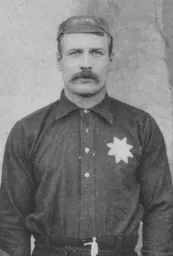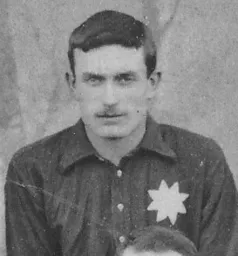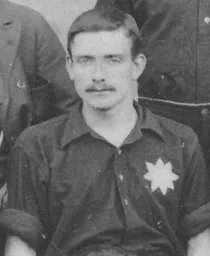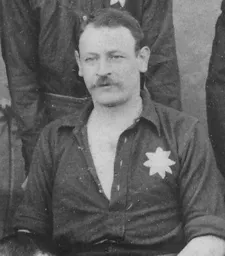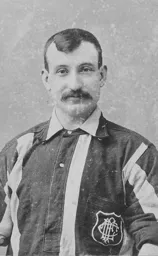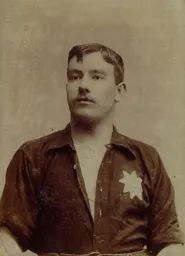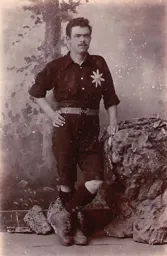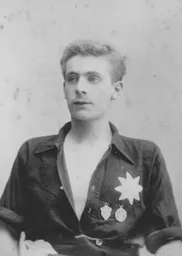The Luton Reporter -
“MIDDLESBROUGH IRONOPOLIS v. LUTON TOWN.—Saturday last was an exceedingly important date in the history of the Luton Town Club, for it witnessed their appearance for the second time in the completion proper for the English Cup, a contest which is engaged in by 32 of the most prominent teams in the country. The system of selection is perhaps sufficiently well known, but it may briefly be explained that about a score of the strongest clubs in the North are joined by 10 divisional champions, who have to fight their way through a preliminary competition. Two years ago, after exerting themselves brilliantly in the qualifying rounds, Luton Town found themselves drawn against Middlesbrough Town. The Lutonians were at that that time far less formidable an organisation that now, but they made a fair show against the Northern rivals on a field which was rendered well-nigh unplayable by ice and snow. This season the calibre of the combinations whom Luton has had to meet in the opening round has been far higher than was the case two years since, and the credit attached to the title of champion is proportionately more worthy to be desired. The first encounter was with the Old Westminsters, when the “reds” overturned most estimates by defeating the old boys by one goal to nothing. This match was decided on their opponents’ ground, but in the next round the Lutonians were fortunate enough to be drawn to play at Luton, when they vanquished Norwich C.E.Y.M.S. by five goals to one. Colchester was the scene of the next match, and the Sherwood Foresters were the adversaries. When the full period had been played the game stood at two goals all, and in the extra half-hour the Bedfordshire players scored another point; but the referee stopped the operations on the score that darkness would prevent further play. On the Saturday before Christmas the Luton men manifested their superiority by defeating the soldiers after a splendid struggle by two goals to one. The Ironopolis (or “Washers” as they are called in their own town from the fact that most them are engaged in some way in dealing with iron in its manufacture) had no such records as this to show, for they were one of the exempted sides, but the fact that they had progressed a good way into the competition in previous seasons and their name, as one of the strongest clubs in the North, sufficed to show that Luton had an exceedingly heavy task in hand. There were no reliable means of adequately forecasting the chances of the locals, but there were many in this district who flattered themselves that their favourites had an exceedingly good chance of making their way into the second round. It is understood that the players themselves were sanguine before the match, and that they started on their lengthy journey in the best of spirits. By arrangement, the Midland Company stopped the North express on Friday due to leave shortly after 1 o’clock, and the members of the team, with which was Harry Whitby as a reserve, were accommodated with a saloon, being joined by half-a-dozen visitors. The team had a splendid sound-off, some 200 or 300 enthusiasts assembling at the Midland station to wish them bon voyage, one elderly lover of the game indicating his wishes by scattering rice freely over the members of the eleven as they entered the carriage. The first stop of any importance was made at Sheffield, where a visit of an hour enabled the travellers to partake of tea in comfort. Resuming the journey, they were joined by the members of the Sheffield United team, who were travelling northwards to play at Newcastle in the same competition, and the Lutonians were interested by having pointed out to them the most prominent of the Sheffield representatives. The remainder of the journey was satisfactorily accomplished, another stay having been made at York, and the iron town was reached at about 8 o’clock. The players at once proceeded to Liddel’s Temperance Hotel in Bridge-street, a comparatively short distance from the station, while the other members of the party looked in another direction for hotel accommodation. Both the eleven and the visitors were glad to retire comparatively early, but a furious hurricane and other causes prevented much rest being obtained. The “reds” took it easy on Saturday morning, but before mid-day they had paid a visit of inspection to the ground on the Paradise-road, which is situated at the Linthorpe end of the town. They were astonished to find that not only was the ground in far from good condition, but that the stand and players’ shed were in a disreputable state. At the time of this visit a very pronounced gale was blowing from end to end of the ground, and it was generally agreed that there was little prospect of a scientific display.
The encounter had been fixed to commence at half-past 2, and at that hour about 1,500 persons had assembled, this number subsequently being swelled until about 2,000 were present. The weather conditions continued to be execrable, for not only was the wind as high as ever, but a drizzling rain had by this time commenced to fall. It was generally conceded that whoever won the toss would stand the best chance of winning the game, for it was justly pointed out that the side which had been struggling to preserve their goal intact in the first half would be somewhat exhausted by the end of that period. Shortly before the time announced the Luton team made their appearance, and were exceedingly warmly greeted, a special cheer being reserved for Galbraith, who came on after the remainder of the players, this recognition being due to the fact that the Luton centre man formerly played for the Ironopolis. The “Nops” followed their adversaries attired in cherry and white stripes, and they were enthusiastically received. At half-past 2 the referee (Mr. J. H. Strawson, of Lincoln) tool charge of the elevens in the following order :—Middlesbrough Ironopolis : Goal, R. Ord ; backs, J. Bell and R. Oliver ; half-backs, D. McNair (captain), D. Gray, and H. Allport ; forwards ; W. Adams and F. Hunt (right), J. M. Moonie (centre), J. Grewar and T. Hunter (left). Luton Town : Goal, E. Bee ; backs, J. Wilson and W. Chesher ; half-backs, J. Watkins, J. W. Julian and A. H. Taylor ; forwards, R. Brown and J. Finlayson, (right) H. Galbraith (centre), F. Allen and J. Dimmock (left). The most important alteration in the home team was that Grewar, who is regarded as one of the finest half-backs in England, had been transferred to the forward rank in order to replace Wallace, who was prevented by an injury from demonstrating to the Luton section of the crowd that he is one of the most formidable forwards in the north. The linesmen were Messrs. T. Welford (Bratton) and J. Lowles (Derby). A sigh of disappointment was emitted by the Lutonians when they discovered that Julian had lost choice of positions, but the inevitable had to be faced, and so Galbraith started operations against a pronounced hurricane and rain storm. The ball proceeded only a few yards into the homesters’ territory, and was soon returned over the centre line, and in order to show the extraordinary kick by one of the home contingent the ball went out clean over the grand stand about a minute from the start. When a goal kick had been obtained Wilson accidentally kicked through his own goal, this action being the result of the adverse conditions under which Luton were playing. Hands for Luton was once of the next noticeable features, the ball being pretty much confined to the Luton quarters. Indeed, it seemed impossible for the defenders to get very far. A little later, however, some exceedingly good passing was put in by the “reds’” front rank, Galbraith being particularly noticeable, and the result of this was that the visitors were enabled to turn the tables on their opponents and become for the once the attacking force. This was not of long continuance, and the leather was again brought into proximity to Bee’s charge, and Chesher in saving conceded a corner. A struggle in front of the Luton uprights followed, but no score resulted, the ball eventually going behind the Bedfordshire men’s line. Grewar was rendering himself very conspicuous in his new position, and on one occasion a grand shot from his foot was as grandly cleared by Chesher in front of goal. The Middlesbrough men shortly afterwards sent in another beauty, which struck the bar and bounded over, to the chagrin of the home sympathisers and the delight of the visitors. Moonie, who had been far from noticeable up to now, sent in a capable attempt which was as finely cleared. A foul against Luton was followed by hands against the “Nops” twice in rapid succession, both these free kicks giving considerable relief to the “reds,” who were being severely pressed. Hands against the defenders afforded an opportunity to Grewar to send in a very hot shot, and an evil result was only avoided by Wilson heading over the bar—a dangerous expedient in any case, and a particularly risky method of clearing in such a high wind. Of course a corner followed, but this was nugatory, and the same fate befell another free kick off Wilson. Just afterwards the spirits of the small band of Luton sympathisers were aroused by the ball being taken over the half-way mark for the second time in the game, this being the result of some extremely pretty play on the part of Brown. The wind and the opposing defence were too strong a combination for the plucky little right winger and the sphere was again brought into the Southerners’ confines. Hands right in goal off Taylor appeared ominous, nut Hunt removed all danger by heading over the cross-bar. The “Nops” were not showing anything like the capable style which had been expected of them, and they failed to profit to the full of the excellent opportunities which the high wind afforded them. They removed a little of the reproach, however, about this time, Hunt opening the sore for them in good style. In spite of this reverse the Southern forwards continued to exert themselves strenuously, and they looked very much like scoring when Dimmock and Allen put in a magnificent short passing run. Taylor presented an excellent opportunity of scoring to Dimmock by a well-judged pass, but the outside left man dashed the hopes of his supporters by shooting over the bar. Julian had been playing brilliantly, and two free kicks in rapid succession were noticed to him hereabouts. By means of the wind the ball was driven down the field and an opportunity was presented to Bee of displaying his rare defensive ability. A grand shot from one of the “Nops’” forwards must have given the Luton keeper an anxious time, but he behaved splendidly and eventually Moonie headed behind. After a corner off Wilson, Adams headed through and thus succeeded in increasing his side’s lead. Moonie struck the post and again Bee rendered himself conspicuous. A foul against Julian was next awarded and a corner against the “reds,” but nothing definite resulted, the leather being sent behind. Dimmock put in one of his lightning runs, but afterwards the ball went out of play off Taylor, who was doing a tremendous amount of work. Allen displayed exceedingly good style just now, and Dimmock was by no means in the rear of his colleague in point of excellence. Grewar headed over the Luton goal at this point, and despite the fact that hands was given against them the “Nops” maintained the pressure and Julian gave them a corner in preserving his side’s fortress intact. Hands against Taylor near the goal threatened danger, and Oliver sent in a long shot from fullback, while McNair experienced hard luck immediately afterwards. The history of the game just now was that of a succession of attempts by the Middlesbrough players, for Hunter headed over and Moonie missed an excellent opportunity. When Bee had saved grandly from Oliver, a Middlesbrough player was penalised for handling the ball at the Luton end. The referee created some dissatisfaction by passing over a like infringement of the rule by Allen and punishing Bell for such an offence. Luton shortly afterwards made another excursion up the field, and Galbraith and Brown exhibited capable style, the latter ultimately missing a fine opportunity of centreing. Hands off Wilson, who had changed positions with Julian, again transferred the scene of operations, and the next items of importance were a foul against Galbraith and a corner against that player’s side. Hunter having been pulled up for an infringement of the off-side law, Finlayson was punished for fouling Moonie. Oliver took the kick, and the ball went through the Luton posts, but inasmuch s it did not touch a second player no score was allowed. Watkins followed the lead of other members of his side by conceding a corner, and Finlayson was responsible for a like action a minute or two later. Hands against the homesters afforded their adversaries another opening, which was taken advantage of by Galbraith and Brown, the former exhibiting exceedingly good judgment. This attack was not long continued, however, and the exchanges thereafter took place at the other end of the field, a corner against the strangers being the only further advantage which accrued to either eleven before the interval, when the score stood :
Ironopolis, 2 ; Luton, 0.
After the resumption Grewar went back to his accustomed post, and Gray joined the front rank men, the obvious intention being to set the former at liberty to watch Galbraith. That he had fully determined to do this was manifested in the first minute, for Grewar was pulled up for fouling the Luton centre man some-what badly. It should be explained that the wind had by this time dropped considerably, and that so far as weather conditions were concerned the teams were on an equality. Despite this and the terribly hard task they had had in defending previously, the Lutonians exerted themselves strenuously, and things looked well for them when Dimmock finished up a splendid run two minutes from the re-start by scoring with a high shot which went in out of reach of the goal-keeper. A corner for Luton was followed by Brown sending in a good attempt which went high over the bar, while a little later a miskick by Chesher enabled one of the “Nops’” front string to distinguish himself similarly. A fast long attempt by Dimmock threatened danger, but it was headed away by Oliver at the expense of a corner. Brown was punished for handling, and Allen for an alleged foul, and then the homesters were pulled up for pushing the last-named. The Lutonians attacked in force, but hands pulled them up, and a corner to them was unproductive. A magnificent shot by Brown fully deserved to score, Ord saving in marvellous fashion. A couple of fouls against the leaders were given in rapid succession, and then the homesters obtained a corner off Watkins. McNair, who had been exhibiting unnecessarily foul tactics, was hurt a trifle, but he was soon enabled to resume. The “Nops” subsequently attacked, and Bee had to save from Hunter and Gray. A foul against Middlesbrough was sandwiched between a couple of decisions against Taylor for handling, and two free kicks in favour of the “Washers” were noticed. Dimmock later on put in the best run of the day, and after eluding two of his speedy opponents finished by forcing a corner, but this was not improved upon. Thereafter there was little of interest to chronicle, save that towards the end the “reds” infused a trifle more dash into their display and threatened to score. This was not effected, however, and when the end came the homesters had qualified for the second round, the scores being:
Ironopolis, 2 ; Luton, 1.
The team returned by a train leaving Middlesbrough at about half-past 7, and reached home at about 5 o’clock on Sunday morning.”

